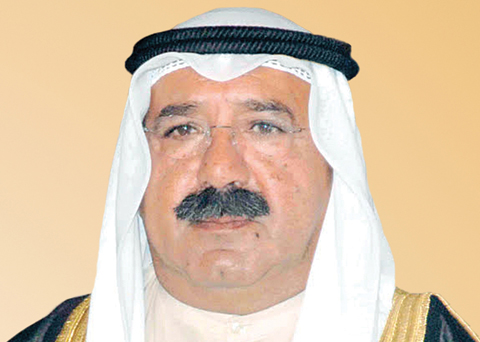
Committee to investigate audit report on ministry’s deals in 2015-2016 and 2016-2017
KUWAIT: First Deputy Prime Minister and Defense Minister Sheikh Nasser Sabah Al-Ahmad Al-Sabah issued a ministerial resolution yesterday to form a committee to investigate the report made by the State Audit Bureau on military enforcement contracts the defense ministry made in 2015-2016 and 2016-2017 fiscal years. The State Audit Bureau report also includes the results of examining the ministry's 2017-2018 budget and reinvestigating financial violations related to the Eurofighter program's memorandum of understanding. The investigation committee includes members from the ministry of justice, the military inspection authority and the military judiciary.
Juvenile employees
The Public Authority for Manpower's central labor inspection manager Mohammad Al-Ansari said the authority is fining employers hiring children aged under 15 who do not hold any work permits. Ansari said with the authority's permission, juveniles aged 15 to 18 can be hired according to conditions of not employing them to do hazardous jobs and having them medically examined. "Juvenile employees below 15 are banned from working in companies and stores," he underlined, noting that all commercial facilities are inspected and are subject to legal measures in case of violations.
"There is no such thing as a juvenile internship or a 100-day trial period," Ansari added, noting that the minimum age to obtain a work permit is 21. In case a juvenile under 18 is found working, they may be deported, their parents will be subjected to legal measures, the sponsor's file gets marked as 'code 72' and the employers are fined. Finally, Ansari said juveniles are not registered with the manpower authority, and accordingly do not receive any compensation for work-related injuries.
Guidance to the youth
Awqaf ministry undersecretary Fareed Emadi said the ministry uses all media methods to convey its guidance to the youth. Emadi added that according to studies, 90 percent of the youth are on social media networks most of the time and that the ministry uses these networks to reach out to them in collaboration with social media celebrities. "Some people no longer accept messages made by mosque imams," he underlined, noting that a strategic plan is being prepared upon direct instructions from HH the Amir to fight extremism. Responding to a question about the prices of hajj convoys, Emadi said that supreme hajj committee formed a special committee to monitor prices, adding that the committee managed to reduce prices to KD 1,500.
Renewable energy projects
A recent report on following up the 2018-2019 plan issued by the ministry of state for economic affairs detected 'sluggishness' in renewable energy projects executed by three different bodies including the Ministry of Electricity and Labor. The report said the budget needed for the project of supplying, installing and maintaining photoelectric panels of Subbiya water reservoirs had not been included in the current fiscal year's budget (2018-2019) and that the project has not started.
The report also said the National Technology Enterprises Company (NTEC) is supposed to execute a project to enhance energy efficiency in government buildings and another to supply, install and operate photoelectric cells in co-ops and house roofs, but both projects are still facing financial and legislative hurdles. The report added that Kuwait Institute for Scientific Research (KISR) has three renewable energy projects including Al-Shaqaya - the one with the highest achievement rates - and another to build a desalination plant run by renewable energy, but stressed that no budget was set for it so far.
Consumption meters
The Cabinet yesterday sought the commerce ministry's opinion on a proposal made to establish a shareholding government company for examining electricity and water consumption meters and collecting fees from consumers. The Cabinet explained that the proposed company's profits should not exceed 10 percent of the shared capital, adding that 24 percent of the shares will be owned by the government and its subsidiary bodies, 26 percent to be offered for public bidding at Kuwait Stock Exchange and 50 percent will be allocated for citizens. "Government bodies have failed to collect dues from consumers and it is high time the private sector takes over this task to achieve transparency, justice and equality," the Cabinet underlined.
Behind schedule
The monthly report issued by the Public Authority for Housing Welfare refuted assurances made by the authority's officials and officials of the Chinese company executing the second contract in Mutlaa City, and warned that the company is behind schedule and might not be able to finish the project by October. The report explained that only 23.21 percent of the infrastructure needed for 18,519 plots is completed, whereas according to the contract, 54.06 percent should have been completed by now, which means that the company is behind schedule by 30.85 percent.
In addition, the report showed that the company failed to meet the September achievement point of 37.44 percent and only achieved 17.81 percent. It also failed to meet the October achievement of 43.16 percent of the work and only achieved 20.54 percent of the work. The report showed that only 12 out of a total of 23 projects executed by the housing authority are ahead of schedule, while 11 are behind schedule.
Cooperatives' law
Ministry of Social Affairs' assistant undersecretary for cooperatives Abdul Aziz Shuaib said the final version of amendments of the new cooperatives' law has been finalized and it will be sent soon to the Cabinet for approval pending referral to the parliament. Speaking during festivities held by the Qairawan heritage village, Shuaib said the new law stipulates that elections will be held every four years to elect nine board members and that the board is entitled to change the administration following every general assembly. Shuaib added that cooperatives that do not comply with Kuwaitization policies will be gradually penalized starting from the second quarter of 2019.
By A Saleh










